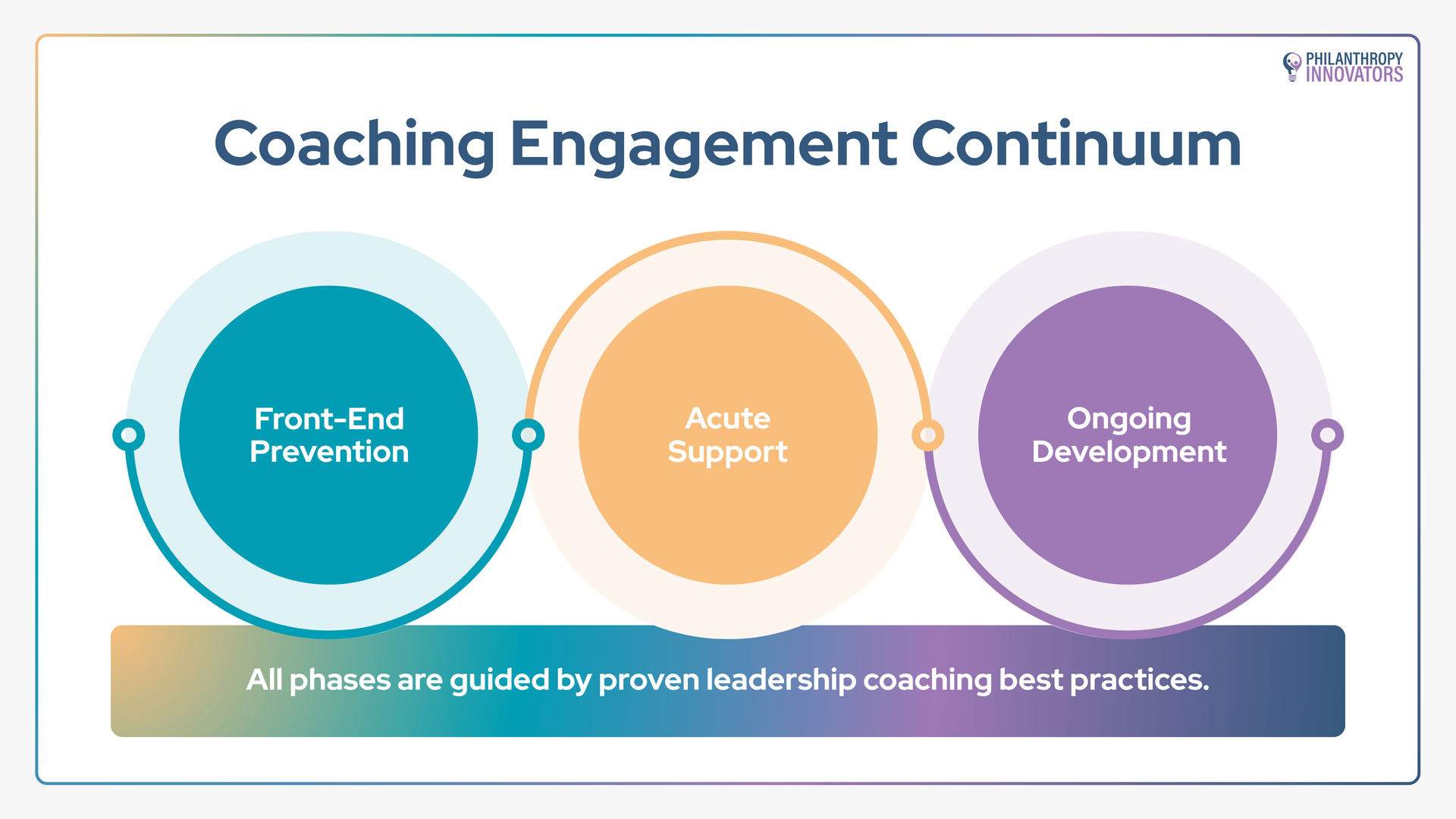Beyond Campaigns & Crises: The Real Value of Coaching for Nonprofit Leaders

Coaching develops the muscles nonprofits need to lead effectively in an increasingly demanding environment.
Today’s nonprofit leaders are navigating some of the most complex conditions the sector has ever seen. Rising costs. Uncertain funding streams. Increased demand for services. And sharper scrutiny on how time and money are spent, including essential programs for team growth and development. In response, many leaders feel pressure to tighten budgets and reserve resources for only the most urgent, visible needs.
Unfortunately, that caution often reinforces a long-standing myth: that executive or leadership coaching is something you call in during a crisis or when gearing up for a major campaign.
But here’s the truth:
coaching isn’t just for emergencies. It’s a
strategic investment that strengthens leadership, clarifies direction, and sustains impact over the long haul. Far from a luxury or a perk, coaching develops the muscles nonprofits need to lead effectively in an
increasingly demanding environment.

Why Some Nonprofit Leaders Still Say “I Don’t Need Coaching”
I’ve worked with plenty of smart, capable executives who at various times have shared the following with me:
- “I’ll call a coach if things really fall apart.”
- “We only budget for consultants during campaigns.”
- “I should be able to figure this out on my own.”
But my real-life experience has shown me that coaching isn’t about fixing broken leaders. It’s about helping good leaders become more focused, more confident, and more effective at guiding their organizations through complex decisions before problems snowball.
Unlike traditional consulting, where someone hands you a roadmap, coaching invites you to chart the course yourself, but with a trusted thought partner by your side. It’s a co-creative process, built around your context, not a one-size-fits-all playbook.
Investments in your teams on the front end—demonstrate your commitment to individual growth and help to extend the longevity of good employees who bring repeat value to your bottom line.
What a Coach Really Brings to the Table
Numerous studies point to the
ROI of leadership coaching, but for nonprofit organizations, the benefits often go beyond financial returns. Some key supports it offers are:
1. Discipline Around ROI Thinking
I often meet teams caught in a cycle of back-to-back internal meetings or planning events without clear objectives. When a leader says they struggle to keep their team focused on external relationships,” I’ll gently ask, “Have you ever tallied up the cost of that two-hour meeting?”
It's easy to lose sight of the real cost (time and money) of internal work. A coach brings the tools and discipline to assess ROI beyond charitable dollars, looking at the time, energy, and opportunity costs of your actions. That kind of clarity leads to sharper decision-making and better use of limited resources.
2. A Safe Sounding Board for Real-Time Decisions
Leadership can be isolating. You can’t always bring tough questions to your board. You may not want to worry your staff. And local peers may be wrestling with similar challenges.
Sometimes, you need a place to triage in real time.
Coaching offers a confidential, judgment-free space to sort through hard decisions. It builds emotional resilience that helps leaders pause, reframe, and respond instead of react.
3. Perspective that Extends Beyond Roles and Organizations
Coaches who’ve worked across multiple nonprofits bring more than anecdotal experience. They see patterns and can identify them quickly in the organizations they serve.
They can help you spot risks and possibilities that aren’t obvious from the inside.
In my own work, I maintain a deep library of tools and templates. If you’re wrestling with an event evaluation or donor segmentation question, chances are I’ve helped someone else solve a similar challenge. We access a variety of experiences to craft a solution specific to your culture and goals.
4. Custom Solutions, Not Cookie-Cutter Advice
A good coach doesn’t walk in with a script. They partner with you to co-create strategies, frameworks, and habits that reflect your values and operating style.
That’s what makes coaching stick. It’s not about solving one isolated problem, but rather strengthening your capacity to lead through all the obstacles that may come your way.
5. Translation of Trends Into Action
Donor expectations are shifting. Things like AI, the $83 Trillion wealth transfer, and
DAFs are changing the game–not to mention new tax legislation that impacts giving for both individuals and corporations.
But if you’re running a lean and focused team, who has time to digest all of the new ideas that come across your desk each week?
A coach with deep fundraising experience helps you zoom out so you can
connect the dots between industry trends and your daily decisions. That means you won’t just react to change, you’ll stay ahead of it.

When Does Coaching Make the Most Sense?
The short answer is
always.
But in practice, coaching adds value in three distinct moments:
1. Before You Launch Something New
Thinking about a new campaign, event, or major program shift? Coaching helps you pressure-test ideas, sharpen strategy, and avoid costly detours. When I work with nonprofit leaders in these situations, at a minimum we’ll examine the following before moving forward:
- Strategic fit
- Resource allocation
- Opportunity cost
2. When You’re in the Middle of a Crisis
Leadership upheaval, board tension, and stalled fundraising are common moments of crisis in nonprofits. When things get messy, a coach offers clear thinking and emotional ballast so you can keep moving forward without unraveling. By working with a coach, leaders are taught to manage their emotions so they can respond strategically.
3. As You Grow Into New Roles
Even high-performing leaders benefit from ongoing reflection and support. Coaching helps you develop your team, evolve your leadership, and build stamina for the long game. Leadership coaching is essential when leaders are:
- Adapting to new roles
- Managing organizational change
- Improving team engagement
- Building resilience
"Even at the highest levels, leaders deserve someone who’s looking out for their growth." – Karen S. Cochran
How to Choose the Right Coach
Finding the right coach is just as important as deciding to invest in coaching in the first place. It’s not a one-size-fits-all relationship. Chemistry, credibility, and context all matter. Here’s what to look for:
#1. Training & Methodology That Grounds Their Approach
Many excellent coaches draw from proven models like
Marshall Goldsmith’s Stakeholder-Centered Coaching or the International Coaching Federation’s core competencies. While you don’t need to see a list of credentials a mile long, you do want a coach whose work is grounded in an intentional framework, not just good intentions.
#2. Experience in the Nonprofit Sector
Nonprofit leadership comes with its own unique dynamics that include board relationships, donor expectations, staff constraints, and mission alignment. A coach who understands the complexities of fundraising and organizational leadership in a mission-driven setting will be far more effective than someone whose background is purely corporate.
Coaches should understand how nonprofits really work—not just how they should work on paper.
#3. A Balance of Flexibility and Rigor
Some coaches follow a rigid, 12-step process. Others build entirely around your needs. Ideally, you want someone who brings structure, but also adapts to what’s most relevant for you and your organization.
#4. Accessibility Between Sessions
Real life doesn’t always wait for your next scheduled call. Look for a coach who’s accessible when urgent decisions arise, whether that’s a quick call, a text, or a sounding board when timing matters most.
#5. Philosophy of Co-Creation
Coaching is not mentorship. It’s not therapy. And it’s not consulting. It’s a partnership. Your coach should treat you as the expert on your organization and bring curiosity, insight, and structure to help you lead with more intention and confidence.

Coaching as a Smart Investment
If the last few years have taught us anything, it’s that leading a nonprofit today requires more than passion. It requires strategic focus, emotional agility, and constant recalibration in an ever-changing landscape.
Coaching isn’t self-indulgent. It’s about developing into the most effective leader you can be.
Especially in times like these, a coach helps you and your team evolve into your best selves—so you can lead with clarity, confidence, and courage.
So let me leave you with this question.
Are you leaving opportunities—and dollars—on the table because you’re trying to go it alone?
Let’s talk. Whether you’re navigating a big decision, preparing for a new chapter, or simply wondering if coaching is right for you, I’d love to connect.
Share this Story:



